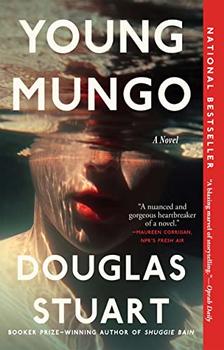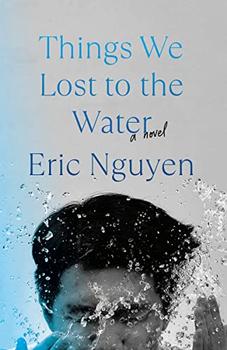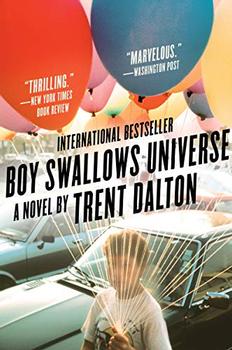Summary | Excerpt | Reading Guide | Reviews | Beyond the book | Read-Alikes | Genres & Themes | Author Bio

Douglas Stuart's Young Mungo follows a crucial year in the life of Mungo Hamilton, a boy growing up in the difficult world of Glasgow's East End estates. Mungo's upbringing is marked by anxiety and hardship. The adults around him struggle with the embittered stasis of poverty, while violence between local Catholic and Protestant gangs presents a constant threat. Despite this, Mungo is a sweet, sensitive boy, possessed with an innocence that inspires fondness in those around him. As he enters his teenage years, however, this affection turns to suspicion; neighbors increasingly comment that the boy is "No' right." Mungo's softness becomes a sign of homosexuality, which, within performatively masculine and homophobic surroundings, is a dangerous thing to be accused of. His mother, in an ill-considered attempt to "make a man out of him," sends him off on a fishing trip with two acquaintances she met in AA — the bawdy, half-witted St Christopher, and the far crueler and more sinister Gallowgate. This is how the novel opens; with Mungo, trapped between these coarse and lurid strangers, riding on a bus out into the distant highlands. As the story flashes between the events of the fishing trip and the year leading up to that point, Stuart reveals a brutal, captivating and tragic parable of the destruction of innocence.
A celebrated son of Glasgow, Stuart writes about his home city in the way only a native can. His rich character studies are full of nuance, and he plumbs depths of feeling from the harshest personas. His mastery of psychology and sense of place is reminiscent of Dostoyevsky; the character of Mungo is even somewhat analogous to Prince Myshkin from The Idiot, with his lightness, gentle nature and philosophical simplicity. Bleak depictions of poverty are shot through with tender scenes of familial love that are quietly touching. These moments of respite, often seen through Mungo's eyes, have a delicate purity, though they are never detached from their grim surroundings.
Though not explicitly dated, the events of Young Mungo are implied to take place around the '80s, a not-too-distant past that will be fresh in the memory of many Glaswegians. It's a dark period in the city's history, as Prime Minister Margaret Thatcher's economic policies thrust many into unemployment, drug use and alcohol abuse. Having grown up in this period himself, the author lucidly recounts the atmosphere of the time. Many of the themes present in Young Mungo will be familiar to readers of Stuart's first novel, the Booker-winning Shuggie Bain, which is set around the same place and time. Yet Young Mungo is more varied and expansive. Stuart delves deeper into the culture of sectarian violence between Protestants and Catholics (see Beyond the Book) through the character of Mungo's brother Hamish. A ruthless Protestant gang leader, Hamish's belief in a brighter future was stamped out at an early age, leaving him with bitter contempt for anyone who still believes they can escape the estates. Stuart provides shocking description of the warfare enacted by Hamish and his ilk, with scenes that seem sickeningly, bone-crunchingly audible. Yet even in his descriptions of violence and ugliness, there is a sense of understanding about the sources of these blights and an empathy for the characters caught up in them. As in Shuggie Bain, Stuart's characters feel like real people, their flaws a response to an environment that is hard and unforgiving.
A cornerstone of the novel is Mungo's relationship with James, a young pigeon enthusiast whose doocot (the Glaswegian pronunciation of "dovecote," a structure for housing pigeons) becomes a sanctuary against the brutality of the estates. Their innocent exploration of their feelings for each other contrasts strongly with the accusatory adults around them, who seem to pinpoint and condemn Mungo's sexuality long before he himself becomes aware of it. Stuart's delicate descriptions of the young boys' budding romance are filled with a rare, naive tenderness. Mungo lovingly describes James's kisses as like "hot buttered toast when you are starving." That James is Catholic adds to the illicit fragility in the Romeo and Juliet quality of their relationship. Also like Romeo and Juliet, there is a sense that their relationship is doomed from the start. Though the two boys try to shelter each other from the rough world that surrounds them, it inevitably comes crashing in. While this isn't a surprise, it's still painful to read.
Above all else, Young Mungo is a brilliant study of the demands of a particular kind of masculinity, one that equates feeling with weakness and callousness with strength. In trying to help "make a man" of Mungo, those around him, even those that love him, expose him to cruelty and violence. The events of the fishing trip are a horrifying extrapolation of where such a mentality can lead. Mungo's innocence is ultimately sacrificed to this misguided ideal of manhood, which only serves to destroy everything it touches. Poignant, harsh and moving, Young Mungo is another masterful work from one of Scotland's finest living writers.
![]() This review was originally published in The BookBrowse Review in May 2022, and has been updated for the
April 2023 edition.
Click here to go to this issue.
This review was originally published in The BookBrowse Review in May 2022, and has been updated for the
April 2023 edition.
Click here to go to this issue.

If you liked Young Mungo, try these:

by Eric Nguyen
Published 2022
A stunning debut novel about an immigrant Vietnamese family who settles in New Orleans and struggles to remain connected to one another as their lives are inextricably reshaped.

by Trent Dalton
Published 2020
An utterly wonderful debut novel of love, crime, magic, fate and a boy's coming of age, set in 1980s Australia and infused with the originality, charm, pathos, and heart of Extremely Loud and Incredibly Close and The Curious Incident of the Dog in the Night-Time.
Your guide toexceptional books
BookBrowse seeks out and recommends the best in contemporary fiction and nonfiction—books that not only engage and entertain but also deepen our understanding of ourselves and the world around us.